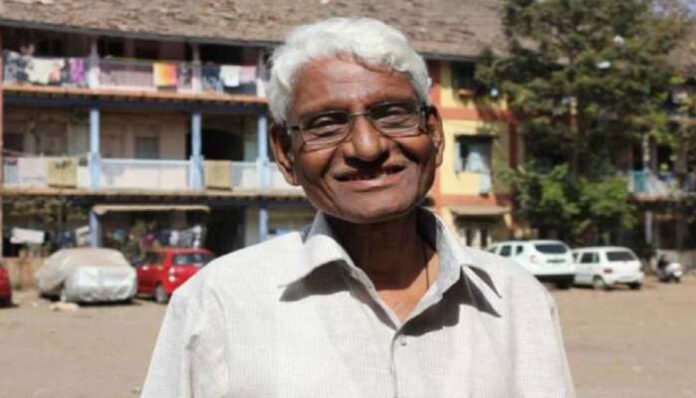The popular leader of Textile mill workers Datta Iswalkar breathed his last on Wednesday in Mumbai. Datta Iswalkar was 72 years old and was not doing well for the last few years.
Datta’s work for the Mill workers is a foundation for the mill workers’ struggle even to this day.
Lyla Bavdam in the Hindu writes-
For someone with humble beginnings, Iswalkar achieved considerable success. He started his career as a peon in Modern Mills at a time when the cotton mills made the erstwhile Bombay hum with commerce and prosperity. At that time, due to the struggles, mill workers managed to get housing, lived on or near their workplaces, and more often than not their children were guaranteed jobs in the same mills.
But when the cotton mill industry faded away all that was left were the empty hulks of the mill buildings, their distinctive chimneys, the workers’ chawls and, most prized, the many hectares that they occupied of prime real estate in central Mumbai. The workers—the backbone of the mills—were suddenly seen as parasites. Mill owners, anxious to monetise their land, wanted the workers to leave. They naturally demanded work or a payoff. This when Datta Iswalkar came into his own
Datta founded the Girni Kamgar Sangharsh Samiti on Gandhi Jayanti 1989 and organised workers under its umbrella. From 1988 to 1990 he and his union were responsible for the revival of 10 defunct mills.
He soon realised that finally, real estate would win. Soon luxury homes, office complexes, and malls will replace the mills. Iswalkar worked to get housing and jobs for the people who will be displaced by the closure of mills. He petitioned the government and is credited with getting homes for at least 15,000 former mill workers.
Jayashree Valenkar writes- Datta Iswalkar was a great strategist and a trade union activist. In the decade of 1980s, amidst the historical textile mill strike and a defeat of workers it was Iswalkar who continued with the issue of housing for workers. He devoted his life for the welfare of textile workers.
Once on hunger strike, there were concerns about his failing health, he tells people – “Do not to worry, even if I die it will help the cause for which we are fighting”.

Iswalkar was a socialist and he had respect for all political parties but he never joined any party himself.
Trade union activist Chandan Kumnar recounts that he was with George Fernandes but when he aligned with BJP they parted ways.
Iswalkar was a grassroots worker and was extremely talented. He would have all statistics and numbers on the tip of his tongue. He presided over many struggles in the last 25 years but one never saw him lose his cool.
In popular culture, labourers are shown as lumpen elements who speak aggressively and use vulgar language, but Datta Iswalkar was the complete opposite of it. He was a cool-headed and very sober person. Instead, he would study the reasons for this aggressiveness among the workers with much sensitivity. In 2014 in one of the seminars at the Global Symposium of Main Inges, he described this behaviour of workers beautifully that left the audience stunned.
In reality, he cherished the most his years of long struggle and his socialist values. All political parties have expressed sorrow at his death. Mill workers are mourning the loss of their guide and their pillar of strength.
































[…] Datta Iswalkar, the mill worker who struggled to give housing to 15000 workers no more […]